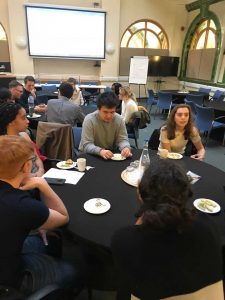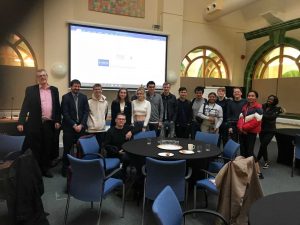On Saturday 10th November we hosted Votes@16:Right Here Right Now, our Economic and Social Research Council Festival of Social Science event. It was held in the Foresight Centre at the University of Liverpool and involved interactive workshops with groups of Liverpool students expressing their views on the voting age and related issues.
Following a brief introduction from Professor Jon Tonge the workshop discussions covered a range of topics from the participant’s personal views on whether the voting age should be lowered to discussions of the role of education in preparing young people to vote and how gaining the right to vote relates to other key markers of transitions to adulthood.
While more students were in favour of votes at 16 than against there were a diverse range of arguments expressed. The groups were enthusiastic, engaged and articulate and their views have given us food for thought and new angles to explore in the project. For example, the participants consistently referenced the increasing pressure young people face around exams and life choices they are expected to make at 16 or earlier regarding their educational and career pathways. However, they were split as to the implications of this for the voting age. Speaking from their own recent experience some suggested that as 14 year olds were entrusted with making subject choices for their GCSE’s, which can have a long term impact on their future, it seemed unfair and inconsistent that they were also judged to be too immature to make a vote choice for another 4 years. Conversely others argued that the unique set of exam burdens, important decisions and teenage life stresses bearing down on young people at 16 was a good argument not to load the additional pressure of voting onto them.

Nuanced views were also expressed on the nature and markers of maturity. Students pointed out that their peers who had gone into the workplace at 16 had levels of responsibility and life experience that many university students lacked, were impacted by government policy more directly and were often more prepared to vote than a 21-year-old who had spent their life in education yet they were often less confident to do so. It was accepted that maturity is ultimately an ambiguous concept and that its relationship to voting rights was less clear cut than often assumed. One interesting perspective was that, bar the introduction of some form of problematic official citizenship exam assessing readiness to vote, the minimum voting age has to be drawn somewhere. Setting it too low risks increasing the numbers of immature voters while setting it too high risks alienating able citizens from the franchise. On balance most agreed that 16 represented a good compromise in this respect especially if there was an increased emphasis on political education in schools which, interestingly, many differentiated from citizenship education. There was also a relevant counter argument expressed that you could not be considered mature enough to vote while still at school and with the leaving age recently raised to 18 the voting age should remain there too. However, in general participants gave short shift to the standard age symmetry argument used by both advocates and opponents of votes at 16. pointing out that voting is a different kind of responsibility and therefore not comparable to other legal minimums.

Overall the event was a success and we have been able to use the workshops as focus group research that will feed directly into the results of the main project. The participants showed a high level self-reflection and recognised that they were a uniquely engaged and politically interested set of people. We are interested in comparing their attitudes and narratives with other less engaged groups and in creating some mixed focus groups in which the relatively engaged interact with the relatively disengaged to deliberate on these issues. We would like to thank the participants for their time and for their thoughtful contributions. Thanks also goes to the ESRC, particularly the Festival of Social Science team, for funding and supporting the event, the Leverhulme Trust for funding our project, the Foresight Centre University of Liverpool for hosting us and to Zarah Ross of Youth Focus North West for her invaluable help both before and during the event.
If you would like further information on the project or are interested in working with us to put on a workshop or focus group, then please contact our Research Fellow Tom Loughran at t.i.loughran@hud.ac.uk